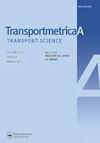The real-time dynamic online feeder service with a maximum headway at mandatory stops
IF 3.1
2区 工程技术
Q2 TRANSPORTATION
引用次数: 0
Abstract
On the one hand, fully flexible demand-responsive feeder services efficiently tailor their service to passengers' needs. Traditional services, on the other hand, offer predictability and easier cost control. This paper considers a semi-flexible feeder service that combines positive characteristics of both traditional and fully flexible services. There are two types of bus stops in this service. Mandatory bus stops have a maximum allowable headway for bus departures. Optional stops are only visited when there is demand for transportation nearby. When new passenger requests arrive, the performance of this feeder service is optimised in real time. A metaheuristic with two phases is developed to optimise the service. The dynamic optimisation method is compared to a model that optimises the service when all requests are known beforehand. The results show that the dynamic method has an average gap of 6.5% with respect to the static model and an average acceptance rate of 95.1%. A case study in the city of Antwerp shows that, when compared to existing transit options in the region, this feeder service can increase the service quality by 31.6% when enough resources are available.
实时动态在线接驳服务,在强制停靠站设有最大车头
一方面,完全灵活的支线服务可因应乘客的需要,有效率地提供服务。另一方面,传统服务提供可预测性和更容易的成本控制。本文研究了一种结合了传统和全柔性两种优点的半柔性馈线服务。这项服务有两种类型的公共汽车站。强制巴士站设有巴士发车时的最大车头距。可选站点只有在附近有交通需求时才会被访问。当有新的乘客要求到达时,支线服务的性能会实时优化。开发了一种具有两个阶段的元启发式方法来优化服务。将动态优化方法与预先知道所有请求时优化服务的模型进行比较。结果表明,动态方法与静态模型的平均误差为6.5%,平均合格率为95.1%。安特卫普市的一项案例研究表明,与该地区现有的交通选择相比,在资源充足的情况下,这种支线服务可以将服务质量提高31.6%。
本文章由计算机程序翻译,如有差异,请以英文原文为准。
求助全文
约1分钟内获得全文
求助全文
来源期刊

Transportmetrica A-Transport Science
TRANSPORTATION SCIENCE & TECHNOLOGY-
CiteScore
8.10
自引率
12.10%
发文量
55
期刊介绍:
Transportmetrica A provides a forum for original discourse in transport science. The international journal''s focus is on the scientific approach to transport research methodology and empirical analysis of moving people and goods. Papers related to all aspects of transportation are welcome. A rigorous peer review that involves editor screening and anonymous refereeing for submitted articles facilitates quality output.
 求助内容:
求助内容: 应助结果提醒方式:
应助结果提醒方式:


